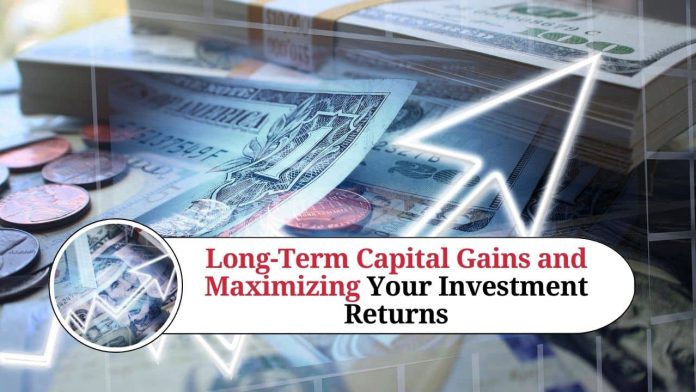Long Term Capital Gain: Understanding the Basics and Benefits
When you sell an asset, such as property or stocks, for a profit, you may be liable to pay taxes on the gain. The amount of tax you pay on the gain depends on whether it is considered a short-term or long-term capital gain. In this blog, we will discuss long-term capital gains, what they are, and the benefits they offer.
What is a Long-Term Capital Gain?
A long-term capital gain is a profit you make on an asset that you have held for more than one year. For example, if you bought shares of a company in 2010 and sold them in 2022 for a profit, the gain would be considered a long-term capital gain if you held the shares for more than a year.
How is Long-Term Capital Gain Taxed?
The tax rate for long-term capital gains is generally lower than the tax rate for short-term capital gains. The tax rate for long-term capital gains depends on your income level and filing status. For the 2022 tax year, the tax rate for long-term capital gains ranges from 0% to 20%.
Benefits of Long-Term Capital Gains
There are several benefits to holding assets for more than one year to qualify for long-term capital gains tax rates:
- Lower Tax Rates: As mentioned earlier, long-term capital gains are taxed at a lower rate than short-term capital gains. This means you get to keep more of your profit.
- Time Value of Money: By holding an asset for a longer period, you give your investment more time to grow in value. This can increase your overall return on investment.
- Deferred Taxes: When you hold an asset for more than one year, you defer paying taxes on any gains until you sell the asset. This means you have more money available to reinvest or use for other expenses.
- Estate Planning: Holding assets for the long-term can also have benefits for estate planning. If you pass on an asset to your heirs, they receive a step-up in basis to the current market value of the asset. This means that any capital gains that occurred during your lifetime will not be taxed.
Strategies for Maximizing Long-Term Capital Gains
Now that you understand the benefits of long-term capital gains, let’s discuss some strategies for maximizing them:
- Hold Assets for the Long-Term: The most straightforward strategy is to simply hold assets for the long-term to take advantage of the lower tax rates. Avoid the temptation to sell for short-term gains and instead focus on a long-term investment strategy.
- Harvest Losses: If you do have short-term losses, you can use them to offset long-term gains. This strategy is known as tax-loss harvesting and can help reduce your overall tax liability.
- Donate Appreciated Assets: Another strategy is to donate appreciated assets to charity. By doing so, you can avoid paying taxes on the capital gains and receive a charitable tax deduction.
- Invest in Tax-Advantaged Accounts: Investing in tax-advantaged accounts such as IRAs or 401(k)s can also help maximize long-term capital gains. Contributions to these accounts are tax-deductible, and gains within the accounts are not taxed until withdrawn.
- Consider Tax-Managed Funds: Finally, consider investing in tax-managed mutual funds or exchange-traded funds (ETFs). These funds are designed to minimize taxes by strategically selling assets with losses to offset gains.
The Importance of Understanding Long-Term Capital Gains
Understanding long-term capital gains is an essential part of managing your finances and planning for the future. By understanding how long-term capital gains work, you can make informed investment decisions and potentially increase your overall return on investment.
Additionally, understanding long-term capital gains can help you avoid potential tax pitfalls. For example, if you sell an asset too soon and trigger a short-term capital gain, you may end up paying more in taxes than necessary.
It’s also important to understand that not all assets qualify for long-term capital gains treatment. For example, certain types of collectibles, such as artwork or coins, are subject to different tax rules. It’s essential to do your research and understand the tax implications of any investment before making a purchase.
Finally, it’s worth noting that tax laws and rates can change over time. It’s important to stay up to date on any changes to tax laws that could affect your long-term capital gains. Consulting with a tax professional or financial advisor can be an excellent way to stay informed and make the best decisions for your financial situation.
Conclusion
Long-term capital gains offer several benefits, including lower tax rates, the time value of money, deferred taxes, and benefits for estate planning. By holding assets for more than one year, you can take advantage of these benefits and potentially increase your overall return on investment. However, it’s important to consult with a tax professional to ensure you understand the tax implications of your investment decisions.
Read more useful content:
Frequently Asked Questions (FAQs)
Q1.) What is a long-term capital gain?
A long-term capital gain is a profit made on an asset that you have held for more than one year before selling.
Q2.) Which assets qualify for long-term capital gains treatment?
Most assets, such as stocks, bonds, and real estate, qualify for long-term capital gains treatment as long as they are held for more than one year before being sold.
Q3.) Are there any assets that do not qualify for long-term capital gains treatment?
Certain assets, such as collectibles, are subject to different tax rules and may not qualify for long-term capital gains treatment.
Q4.) How can I maximize long-term capital gains?
You can maximize long-term capital gains by holding assets for the long-term, harvesting losses to offset gains, donating appreciated assets to charity, investing in tax-advantaged accounts, and considering tax-managed funds.
Q5.) Can I donate appreciated assets to charity to avoid paying taxes on capital gains?
Yes, donating appreciated assets to charity can help you avoid paying taxes on capital gains while also providing a charitable tax deduction.
Q6.) Are there any downsides to holding assets for the long-term?
While holding assets for the long-term can offer many benefits, there is always the risk that the asset may decrease in value, resulting in a loss.
Q7.) Do tax laws and rates for long-term capital gains change over time?
Yes, tax laws and rates can change over time, so it’s important to stay informed and consult with a tax professional or financial advisor.
Q8.) Should I consult with a financial advisor or tax professional before making investment decisions related to long-term capital gains?
Yes, consulting with a financial advisor or tax professional can help you make informed investment decisions and minimize your tax liability.




















